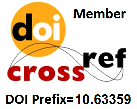Publication Ethics and Malpractice Statement
Publication Ethics and Malpractice Statement
The Libyan Journal of Ecological & Environmental Sciences and Technology (LJEEST) is fully committed to achieving the highest standards of academic integrity and transparency required for indexing in prestigious international databases such as Scopus and Web of Science. This charter is based on the guidelines set forth by the Committee on Publication Ethics (COPE) and is considered an integral part of the Journal’s policy.
1. Strict Commitment to Originality and Combating Malpractice
• Plagiarism Detection: The Journal takes rigorous measures to detect all forms of plagiarism. All submitted manuscripts are mandatory screened using the internationally recognized plagiarism detection software "Turnitin". Exceeding a pre-determined similarity threshold, or the discovery of any form of plagiarism, will result in immediate rejection and documentation of the violation.
• Data Integrity: All data and results presented must be accurate and truthfully representative of the research work. Data Fabrication or Falsification is considered a serious malpractice and is grounds for the formal Retraction of the published paper.
• Duplicate and Concurrent Publication: Authors must confirm that the manuscript has not been published or submitted simultaneously to any other journal.
2. Transparency in Authorship and Conflict of Interest (COI)
• Authorship: Authorship should only be granted to individuals who have provided a significant intellectual contribution to the research. The Corresponding Author is responsible for ensuring that all listed authors have approved the final version before publication.
• Financial Disclosure and COI: All authors, reviewers, and editorial board members must disclose any relationships or funding sources that may lead to a financial, personal, or academic Conflict of Interest (COI).
3. Editorial Policy and Immediate Action on Malpractice
• Impartial Decision-Making: The Editorial Board makes publication decisions based solely on the quality and scientific significance of the research, free from any commercial influence or bias against any author.
• Accountability and Corrective Action: Should a substantial error or malpractice be discovered in a published work, the Journal is committed to following the COPE flowcharts for resolving the issue, which may involve publishing a Correction, an Expression of Concern, or a Retraction.
4. Published Paper Retraction Policy
The Retraction Policy serves as the last resort to safeguard the integrity of the scholarly record. LJEEST adheres strictly to COPE guidelines for retraction, which is implemented only in the following critical circumstances:
1. Conclusive Evidence of Malpractice: When clear evidence of data fabrication, falsification, or severe plagiarism is found, which fundamentally compromises the reliability of the results.
2. Major Scientific Errors: When the paper contains critical scientific or computational errors that render the findings unreliable or unsuitable for future research.
3. Unauthorized Duplicate Publication: When it is discovered that the paper has been published elsewhere without prior disclosure or consent.
Retraction Procedure:
• A formal "Notice of Retraction" is published and cross-referenced with the electronic and print versions of the original paper.
• The original paper remains accessible on the website with a clear watermark indicating "Retracted" to prevent misuse, along with a statement detailing the reason and date of the retraction.
• All relevant indexing services and databases (e.g., Scopus) are formally notified of the retraction action.










